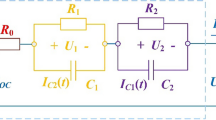Abstract
A method based on strong tracking unscented Kalman filter with multiple suboptimal fading factors (MSTUKF) was proposed to accurately estimate the state of charge (SOC) of power batteries of electric vehicles online. Taking a certain lithium-ion battery as the research object, a second-order RC equivalent circuit model of the battery was established based on its external characteristics and related mechanism. Then the recursive least squares method with forgetting factor was adopted to identify the model parameters, and the MSTUKF nonlinear state space equation of the battery was established according to the equivalent circuit model. Finally, the SOC estimation algorithm was verified by simulation experiments under ECE15 and UDDS conditions. The results show that the error of MSTUKF in SOC estimation of lithium-ion battery is kept within 1.5%, so this method can estimate battery SOC accurately.









Similar content being viewed by others
Data availability
All relevant data are within the paper.
References
Chen, Z., Wang, Z. D., Mou, W. B., Zhu, P. W., & Xiao, G. (2023). State-of-charge estimation of lead-carbon batteries based on the PNGV model and an adaptive Kalman filter algorithm. Energy Storage Science and Technology, 12(3), 941–950.
Fu, S. Y., Lyu, T. L., Min, F. Q., Luo, W. L., Luo, C. D., Wu, L., & Xie, J. Y. (2021). Review of estimation methods on SOC of lithium-ion batteries in electric vehicles. Energy Storage Science and Technology, 10(3), 1127–1136.
Gao, W. Z., & Huang, T. (2020). Research on SOC estimation method of unscented Kalman filter for lithium battery. Telecom Power Technology, 37(3), 19–20.
Gong, M. H., Wu, J., & Jiao, C. Y. (2020). SOC estimation method of lithium battery based on fuzzy adaptive extended Kalman filter. Transactions of China Electrotechnical Society, 35(18), 3972–3978.
Huang, J. Y., Li, L. F., Zhang, Y., & Song, X. Y. (2021). Estimation of state of charge for lithium-ion battery based on multi-innovation recursive least square algorithm and unscented Kalman filter. Chinese Journal of Power Sources, 45(6), 711–715.
Huang, Z. J., Chen, Y., & Zhou, M. F. (2023). Soc estimation of Li-ion battery based on adaptive CKF algorithm. Chiang Mai Journal of Science, 50(6), 1–9.
Huang, Z. J., & Fang, Y. S. (2020). SOC estimation of Li-ion battery based on UD factorized adaptive EKF. Chinese Journal of Sensors and Actuators, 33(4), 552–556.
Huang, Z. J., Fang, Y. S., & Xu, J. J. (2021). SOC estimation of Li-ion battery based on improved EKF algorithm. International Journal of Automotive Technology, 22(2), 335–340.
Kaleli, A., & Akolas, H. I. (2023). Recursive ARMAX-based global battery SOC estimation model design using Kalman filter with optimized parameters by radial movement optimization method. Electric Power Components and Systems, 51(11), 1027–1039.
Kim, M.H., Kim, K.R., Kim, J.S., Yu, J.W., Han S.H. (2018). State of charge estimation for lithium ion battery based on reinforcement learning. In 10th IFAC Symposium on Control of Power and Engery Systems CPES 2018: Tokyo, Japan, vol. 51, no. 28, pp. 404–408.
Liu, D., Huang, B. X., Wang, Y. Q., Yan, X., & Wang, Y. (2019). Inflection point Ah-total integration method for real-time integration to correct lithium battery SOC. Energy Storage Science and Technology, 8(5), 850–855.
Liu, D. L., Fan, Y. C., Wang, S. L., & Xia, L. L. (2021). Estimation of Li-ion battery SOC based on RFMRA and improved PNGV model. Battery Bimonthly, 51(5), 470–473.
Liu, F., Ma, J., Su, W. X., Dou, R. Z., & Lin, H. (2020). State of charge estimation method of electric vehicle power battery life cycle based on auto regression extended Kalman filter. Transactions of China Electrotechnical Society, 35(4), 698–707.
Liu, P., Li, Y. W., & Liang, X. C. (2022). Estimation of lithium battery SOC based on FFRLS and AUKF. Automobile Technology, 2, 21–27.
Liu, P., Liang, X. C., & Huang, G. J. (2021). A review of lithium-ion battery models. Chinese Battery Industry, 25(2), 106–112.
Qian, H. M., Huang, W., Sun, L., Xu, J. X., & Ge, L. (2013). Attitude estimation of strong tracking UKF based on multiple fading factors. Systems Engineering and Electronics, 35(3), 580–585.
Shi, Y. S., Shi, L. P., Wei, H., & Yu, M. J. (2019). An improved SOC estimation method for lithium ion battery. Chinese Journal of Electron Devices, 42(1), 138–141.
Sturm, J. (2018). State estimation of lithium-ion cells using a physic chemical model based extended Kalman filter. Applied Energy, 223, 103–123.
Wang, T. P., Chen, S. Z., & Ren, H. B. (2018). Model-based unscented Kalman filter observer design for lithium-ion battery state of charge estimation. International Journal of Energy Research, 42(4), 1603–1614.
Xiong, R., Cao, J. Y., & Yu, Q. Q. (2018). Reinforcement learning-based real-time power management for hybrid energy storage system in the plug-in hybrid electric vehicle. Applied Energy, 211, 538–548.
Zhou, D. H., Xi, Y. G., & Zhang, Z. J. (1991). A suboptimal multiple fading extended Kalman filter. Acta Automatica Sinica, 17(6), 689–695.
Zhu, R., Duan, B., Wen, F. Z., Zhang, J. M., & Zhang, C. H. (2019). Lithium-ion battery modeling and parameter identification based on decentralized least squares method. Journal of Mechanical Engineering, 55(20), 85–93.
Acknowledgements
This work was funded by Department of Education of Zhejiang Province, China (Project number: Y202249818).
Author information
Authors and Affiliations
Corresponding author
Additional information
Publisher's Note
Springer Nature remains neutral with regard to jurisdictional claims in published maps and institutional affiliations.
Rights and permissions
Springer Nature or its licensor (e.g. a society or other partner) holds exclusive rights to this article under a publishing agreement with the author(s) or other rightsholder(s); author self-archiving of the accepted manuscript version of this article is solely governed by the terms of such publishing agreement and applicable law.
About this article
Cite this article
Huang, Z., Xiang, T., Chen, Y. et al. SOC Estimation of Li-Ion Power Battery Based on Strong Tracking UKF with Multiple Suboptimal Fading Factors. Int.J Automot. Technol. (2024). https://doi.org/10.1007/s12239-024-00093-9
Received:
Revised:
Accepted:
Published:
DOI: https://doi.org/10.1007/s12239-024-00093-9




